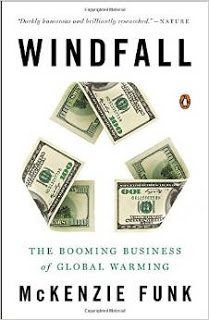| Online: | |
| Visits: | |
| Stories: |

| Story Views | |
| Now: | |
| Last Hour: | |
| Last 24 Hours: | |
| Total: | |
Windfall — the review
Read aguanomics http://www.aguanomics.com/ for the world’s best analysis of the politics and economics of water
I ordered this book (subtitle: “The Booming Business of Global Warming”) as soon as I saw the premise: an exploration of the businesses that will profit from climate change and the businesses whose profits are driving climate change.
Restated from a positive perspective, these businesses profit from adaptation or a lack of mitigation, respectively.
Restated from a normative perspective, they are businesses that serve or exploit society.
So you can see that there’s going to be a lot of hope and anguish in this book, except that it’s often buried under discussions of revenue, jobs and market share. As an economist, I can appreciate the fact that money incentivizes a lot of behavior. As a human, I am horrified that so many clever people are making money on the corruption, fear and ignorance of politicians. (The book does not discuss a carbon tax or other mitigation policies that would erase the profits under discussion, and that’s not the author’s job. It’s just a context that depresses me whenever I think of the magnificence of our “civilization” that humans seem determined to ruin.)
Right.
So… the book is divided into three sections: Melt, Drought, and Deluge.
In Melt, Funk tells about Canada’s rush to defend the Northwest passage that’s opening with the shrinking arctic; how Shell oil went from “planning for less oil” to “drilling the arctic” as politicians left the path of Blueprints (limiting carbon emissions) for Scramble (dealing with too much carbon); the development of natural resources (and political shenanigans) as Greenland loses its glaciers; and how the Israelis got into selling (artificial) snow in the Alps. These chapters describe businesses that are making money as ice melts.
In Drought, Funk joins private firefighters that protect insured houses while neighbors burn down; the traders who buy and sell water rights (covered often in this blog); the rush to buy farmland in poor countries to ship food to richer countries (see my article PDF); and the battle to halt desertification in Africa (and the refugees fleeing that desertification for Europe). These chapters are about the rich getting richer as they plan ahead and hedge their lifestyles, while the poor are increasingly marginalized.
In Deluge, Funk explores the tensions along Bangladesh’s borders, which are likely to be overrun as some of the 150 million residents flee their sinking, flooding delta; how the Dutch are willing to sell seawalls to anyone with cash (sorry Bangladeshis!); the quest to outwit nature by destroying mosquitoes before they can bring tropical diseases to middle latitudes; and the hopes of geoengineers (a group that deserves to be slandered with rain makers). Yes, there are some “solutions” in these chapters, but their cost (via adaptation) is so extravagant compared to mitigation that I think that we should be handing out penny-wise, pound-foolish awards to our so-called “leaders.”
In his final chapter, Funk reflects on his six years of seeing, thinking and talking about climate change. His words say it best:
In psychology, magical thinking is the fallacy that thoughts correspond to actions— that to think is to do, to believe is to act. Perhaps the most magical assumption of the moment is that our growing belief in climate change will lead to a real effort to stop it. But as I discovered in Canada and Greenland and Sudan and Seattle and all over the globe, that is not automatically true. We are noticing that in this new world, there is new oil to find. There is new cropland to farm. There are new machines to be built. From what I have seen in six years of reporting this book, the climate is changing faster than we are.[snip]
The hardest truth about climate change is that it is not equally bad for everyone. Some people — the rich, the northern — will find ways to thrive while others cannot, and many people will wall themselves off from the worst effects of warming while others remain on the wrong side. The problem with our profiting off this disaster is not that it is morally bankrupt to do so but that climate change, unlike some other disasters, is man- made. The people most responsible for historic greenhouse emissions are also the most likely to succeed in this new reality and the least likely to feel a mortal threat from continued warming. The imbalance between rich and north and poor and south — inherited from history and geography, accelerated by warming — is becoming even more entrenched
[snip]
Climate change is often framed as a scientific or economic or environmental issue, not often enough as an issue of human justice. This, too, needs to change. From this moment on, many of us could get rich. Many of us could get high. Life will go on. Before it does, we should all make sure we understand the reality of what we’re buying.
The people who should read this book cannot afford it or cannot be distracted from their profits. What should those who read it do? The only action that comes to mind is revolution, but that’s unlikely to succeed when citizens are distracted and deluded (e.g., Russia and the US), reactionaries are backed by crony capitalists (e.g., Egypt and Turkey), or people are too worried about big screen TVs to see the bigger picture (e.g., India and Australia). Indeed, it’s hard to see how any leaders can win support from voters by promising less now for more later. Does this mean that China’s dictators are our last hope?
Bottom Line: I give this book FIVE STARS for exploring the stories of those who are profiting from our demise.
Source: http://www.aguanomics.com/2015/06/windfall-review.html




